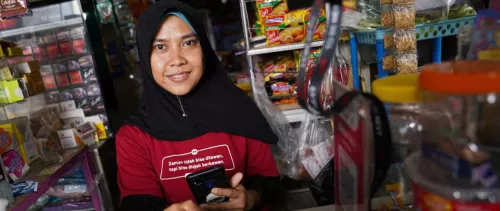
For some time, it’s been clear to us at the World Bank that expanding use of digital financial services supports economic development and poverty reduction. In our work with developing countries around the world, we’ve observed that countries with deeper, more developed financial systems achieve higher economic growth and faster reductions in poverty and income equality.
As the world grapples with the COVID-19 crisis, the importance of digital financial services in providing secure, low-cost and contactless financial tools to citizens and governments has become even more apparent. In a new report published this week, we explain how gaining access to basic financial services—such as transaction accounts, credit, savings products and insurance—help the poor increase their incomes and become more resilient. For women, the ability to send and receive payments, save, and get credit for expanding their businesses can be transformational.
Gaining access to basic financial services—such as transaction accounts, credit, savings products and insurance—help the poor increase their incomes and become more resilient.
Digital technologies are making it possible to bring these services to people who lack access--almost two-thirds of adults in developing world. Technology is lowering costs by maximizing economies of scale. It is increasing the speed, security and transparency of transactions and allowing for development of sustainable financial products tailored to the needs of people with very low, erratic incomes. Technology is removing the barriers to providing financial services, such as lack of identification and formal income, and geographic distance.
Mobile money has leveraged high mobile phone penetration in many developing countries to deliver a ‘first wave’ of digital financial services. Today, there are over 850 million registered mobile money accounts across 90 countries, with $1.3 billion transacted through these accounts every day. Sub-Saharan Africa has become a leader in mobile money, with over a fifth of the adult population having a mobile money account. This region has also shown that these accounts can provide a basis for more sophisticated financial services, such as digital lending and insurance. Large e-commerce platforms and telecom operators have leveraged the ability of digital finance to facilitate payments to offer services such as lending, insurance, and ‘pay-as-you-go’ solar energy.
Sub-Saharan Africa has become a leader in mobile money, with over a fifth of the adult population having a mobile money account.
For example, Pula, a 4-year old microinsurance firm based in Nairobi, Kenya, provides protection for low-income people—including 1.7 million smallholder farmers in ten African countries and India. It uses satellite and other data, combined with artificial intelligence, to price estimated basis-risk-payouts into premiums and to determine whether an insured event has occurred. Pula’s novel business model includes designing and selling weather- and yield-index insurance as bundles, with the insurance policy embedded into the price of seed, fertilizer or credit. This avoids the need to settle claims physically with an adjuster making a traditional field visit. Payouts are made by text.
In the Middle East, humanitarian agencies are working with the Anglo-Jordanian technology company and IFC client, IrisGuard, to use its iris-scanning software and financial platform to authenticate the identities of refugees in Egypt, Iraq, Jordan, Lebanon, and Syria. This technology enables refugees to receive food, cash-based assistance, medical treatment, and remittances, with less risk of corruption and identity theft and more reliable networks.
The current COVID-19 pandemic has heightened the urgency of using digital financial services.
The current COVID-19 pandemic has heightened the urgency of using digital financial services to keep financial systems functioning and keep people safe during this time of social distancing, falling demand, reduced input supply and tightening credit conditions. Fintech is helping governments quickly and securely reach people with cash transfers and other forms of financial assistance and reach businesses with emergency liquidity. It is allowing people to transfer funds—including cross-border remittances—and to pay bills from their home, or in a market or store setting, with no physical contact.
But the potential is much larger than what has been achieved. This crisis has highlighted the benefits of digital financial services in many different dimensions and its critical role in achieving the Sustainable Development Goals. Essential elements for accelerating this development are:
- Investment in the prerequisites for developing digital financial services, such mobile broadband infrastructure—especially in remote areas, and development of agent networks that meet individuals’ local need to cash in and cash out;
- Expansion of digital identification, including biometric systems;
- Expansion of open application programming interfaces—publicly available means for developers to access proprietary software so that new applications can communicate and interact with one another;
- Legal and regulatory frameworks that allow most people to benefit from digital financial services and ensure a competitive ecosystem, with an important consideration being whether and how to permit non-banks to have access to national payment infrastructure and issue electronic money;
- Enabling access to government data platforms.
In addition to these enablers for digital financial services, it is important to manage the risks. For users, the data trails created by digital financial services can expose them to unauthorized disclosure, misuse of personal data, and discrimination. Unequal access to technology and the ‘digital divide’ can exclude the poor, particularly women, from benefits. Financial literacy programs are necessary to ensure new users of financial services don’t fall prey to over-indebtedness or predatory lending and end up worse off.
The World Bank will continue working with public and private sectors to help more countries responsibly expand access to digital financial services. An invaluable short-term benefit is hastening the resolution of the health emergency, support economic recovery, and underpin the return to economic growth. Over the longer-term, it is expected to contribute significantly to economic development and ending poverty.
Original Source : World Bank Blogs


